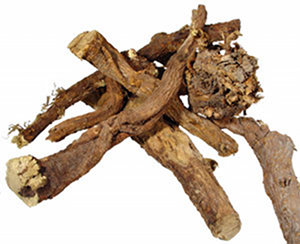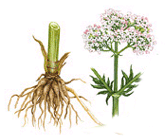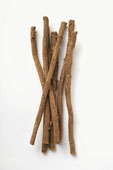| Share |  |
 | |||
God's Good Herbs - Licorice Root
 Licorice root is one of the most widely studied and commonly used herbs in Western herbal medicine. It is also highly regarded in modern Chinese medicine, being prescribed more than any other herb with the exception of ginseng. It is thought to maintain balance in the body and is therefore included in many Chinese herb combinations for the purpose of balancing other herbs. One of its first reported medicinal users were Greeks, who recommended it for the treatment of gastric and peptic ulcers.
Licorice root is one of the most widely studied and commonly used herbs in Western herbal medicine. It is also highly regarded in modern Chinese medicine, being prescribed more than any other herb with the exception of ginseng. It is thought to maintain balance in the body and is therefore included in many Chinese herb combinations for the purpose of balancing other herbs. One of its first reported medicinal users were Greeks, who recommended it for the treatment of gastric and peptic ulcers.
Grown primarily in subtropical and temperate climates, the therapeutic compounds of this tall, hardy perennial plant reside in its long, cylindrical roots. Its official name, “Glycyrrhiza”, literally means “sweet root” in Greek. When these aged roots are boiled in water, an extract 50 times sweeter than cane sugar is produced. This extract is used to both sweeten and flavor authentic licorice candy (anise oil is used to flavor most licorice candy today), cough syrups, tobacco products and beverages.
Glandular and Immune System Benefits
Ironically, one of the many uses for licorice root as an herbal remedy is in regulating blood sugar levels. It is used alone or in herbal formulas by many naturopathic doctors and clinical herbalists to help reduce cravings for sweets and to balance blood sugar levels in those with conditions such as hypoglycemia (low blood sugar), diabetes (excess blood sugar) and obesity. Licorice root also enhances the function of the adrenal glands, improving resistance to physical and emotional stress. The presence of “glycyrrhizin”, the major active component in licorice root, helps to prevent the breakdown of important adrenal hormones such as cortisol. This is beneficial to the body due to the fact that cortisol plays such a vital role in energy production. Insufficient cortisol levels are associated with conditions such as fatigue, chronic fatigue, fibromyalgia, and Addison’s disease. Cortisol is also essential to the regulation of blood sugar in addition to inflammation and immune system functions.
Licorice root also enhances the function of the adrenal glands, improving resistance to physical and emotional stress. The presence of “glycyrrhizin”, the major active component in licorice root, helps to prevent the breakdown of important adrenal hormones such as cortisol. This is beneficial to the body due to the fact that cortisol plays such a vital role in energy production. Insufficient cortisol levels are associated with conditions such as fatigue, chronic fatigue, fibromyalgia, and Addison’s disease. Cortisol is also essential to the regulation of blood sugar in addition to inflammation and immune system functions.
Studies on the various properties of licorice show that it also enhances the role of the immune system by boosting levels of interferon, an anti-viral agent that works in a powerful way to prevent viruses from reproducing. These anti-viral properties contained in the glycyrrhizin found in licorice root can inhibit viruses such as the Epstein Barr virus, a causal factor in chronic fatigue syndrome. Another substance in licorice, saponins, is thought to aid the multiplication of macrophages, immune cells that engulf and consume infectious bacteria. In addition, the antioxidant compounds present in licorice root inhibits the formation of free radicals, thereby preventing free radical damage.
Digestive and Respiratory Support
Licorice is particularly beneficial for treating conditions of the digestive tract. It stimulates the growth of the natural mucous linings of the stomach and intestines, which soothes and coats irritation caused by acid. Having sufficient mucus linings reduce levels of acid and inflammation that often cause acid indigestion, gastritis and ulcers. A medical journal in Ireland published results of one trial conducted with 874 duodenal-ulcer sufferers over a 12-week period of time. This study showed that the ulcers healed faster and without side effects using licorice than they were when common popular stomach medication were used. The symptoms of inflammatory bowel disorders, such as colitis, can also be relieved with the use of licorice root.
Licorice contains several properties that make it effective in treating common coughs and colds. Its soothing properties help relieve sore throats while anti-spasmodic, anti-allergenic and anti-inflammatory properties bring relief to irritating coughs, asthma and chest infections. As an expectorant, the glycyrrhizin in licorice increases respiratory mucus production, which helps liquefy mucus and facilitate its discharge from the body. Many cough lozenges and syrups use licorice as a cough suppressant as well as a flavoring to mask the taste of other medicinal ingredients. Gargling with a solution of licorice can help to relieve oral inflammation and heal mouth ulcers. Licorice Forms and Usage Guidelines
Licorice Forms and Usage Guidelines
Licorice root can be taken in many forms: whole licorice root, licorice tea, extract, syrup, capsules, chewable tablets, wafers, topical preparations and powders. Besides regular, standard licorice made from whole licorice root, another form of licorice exists where the component of glycyrrhizin is eliminated. This form of licorice is known as DGL, which stands for de-glycyrrhizinated licorice.
DGL is generally taken in the form of chewable tablets chewed slowly before or between meals. For treating a peptic ulcer, 300-400 milligrams in chewable form should be taken approximately 20 minutes before a meal. One-half to 1 teaspoon of DGL powder can be used in the same manner. The powder can also be made into a paste or mouthwash to treat mouth ulcers.
Licorice tea may be made by boiling a half of an ounce of the root chips in a pint of water for 15 minutes or a cup of tea may be made by placing ½ to 1 teaspoon of licorice powder in a cup of boiling water. Licorice root capsules or tinctures may also be used according to the directions on the container.
Potential Side Effects and Cautions 
As beneficial as the compound glycyrrhizin is to the body for many ailments, it can result in the retention of water and sodium when taken in large amounts over an extended period of time. Some sources say that it should not be taken in amounts greater than three grams per day for longer than six weeks if a person has a tendency towards high blood pressure or fluid retention. Others recommend that whole licorice or standard licorice root be avoided altogether in cases of high blood pressure or if digitalis is being taken. It is also not recommended for those who take diuretics, who are pregnant or who have liver, kidney or heart disease. Dizziness and headaches can be early symptoms of an overuse of licorice, in addition to water retention, high blood pressure or erratic heart palpitations that could occur with prolonged use. A potassium supplement can avert many of these effects. These symptoms are more likely to occur when licorice-derived drugs or extracts are used rather than whole licorice root. There are no known interactions or side effects associated with the use of DGL.
Although the majority of people can use licorice safely in moderation, if there are questionable health conditions present, it is advisable to be monitored by a competent health care practitioner when taking this (or any herb) that could produce side effects.
Sources:
Nature’s Pharmacy by Steven Horne
http://www.licoriceroot.net/
http://www.naturalherbsguide.com/licorice.html
http://www.herbsarespecial.com.au/free-herb-information/licorice.html
http://www.herbwisdom.com/herb-licorice-root.html
http://www.drweil.com/drw/u/id/REM00024
http://www.advance-health.com/cortisol.html
http://www.nutritional-supplement-educational-centre.com/benefits-of-licorice-root.html
http://www.herbs2000.com/herbs/herbs_licorice.htm
Copyright © 2008-2015 Lucinda Bedogne, CNHP, CNC
Reader Comments...
| 2012-01-07 00:42:06 "Don't have enough money to buy some real estate? Worry not, because it is real to get the loan to resolve such kind of problems. Thence take a auto loan to buy everything you want. " - Erica |
| 2011-11-14 05:14:14 "That's perfect that people can take the business loans and it opens up completely new chances. " - Paula |
Post Your Comment...
|
|
||||||||||||



